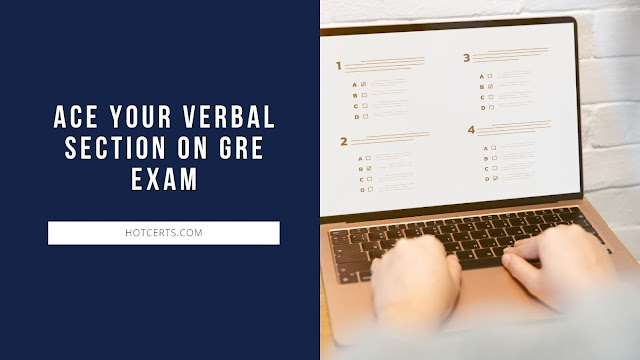GRE-Verbal GRE Section One : Verbal Exam
Introduction
The GRE (Graduate Record Examination) is a standardized test required for admission to various graduate and business programs. The GRE consists of three main sections: Verbal Reasoning, Quantitative Reasoning, and Analytical Writing. In this article, we will focus on the GRE Verbal section, specifically Section One: Verbal Exam. This section assesses your ability to understand written material, evaluate arguments, and express ideas clearly and effectively. Let's dive into the details of what you can expect from the GRE Verbal Section One.
Understanding the GRE Verbal Section
What is the GRE Verbal Section?
The GRE Verbal Section, also known as Section One, is designed to test your verbal reasoning skills. It consists of two tasks: Reading Comprehension and Text Completion. These tasks evaluate your ability to read and understand complex texts and your vocabulary skills.
Structure of the GRE Verbal Section
The GRE Verbal Section consists of approximately 20 questions, divided into two parts: Reading Comprehension and Text Completion. Each part assesses different aspects of your verbal skills.
Reading Comprehension
In the Reading Comprehension part, you'll encounter passages on a variety of topics. Your task is to read these passages and answer questions that test your ability to understand the author's message, draw inferences, and identify the main ideas.
Text Completion
Text Completion tasks present you with sentences with missing words. You need to choose the correct words to complete the sentences, which demands a strong vocabulary and an understanding of the context.
Scoring
The GRE Verbal Section is scored on a scale of 130 to 170 in one-point increments. Your performance on this section is a crucial factor for your graduate school admission, so preparing for it is essential.
How to Prepare for the GRE Verbal Section
Study Materials
To excel in the GRE Verbal Section, you should invest in quality study materials. Consider using official GRE prep books and online resources. These materials provide practice questions and offer valuable insights into the test format.
Vocabulary Building
A strong vocabulary is key to success in the Text Completion tasks. Use flashcards, vocabulary apps, and read widely to improve your word knowledge.
Time Management
Time is of the essence during the GRE exam. Practice time management strategies to ensure that you can complete all the questions within the allotted time.
Test-Day Tips
On test day, remember to stay calm and focused. Here are some tips to help you perform your best:
- Get a Good Night's Sleep: A well-rested mind performs better.
- Read Carefully: Pay close attention to passages in the Reading Comprehension section.
- Eliminate Wrong Choices: In Text Completion, eliminate obviously incorrect choices to narrow down your options.
Conclusion
The GRE Verbal Section One, focusing on Reading Comprehension and Text Completion, is a critical part of the GRE exam. Adequate preparation, especially in vocabulary and time management, is essential for success. Your performance in this section can greatly influence your graduate school admission prospects.
Frequently Asked Questions
- What's the difference between GRE Verbal Section One and Two?
- Section One focuses on Reading Comprehension and Text Completion, while Section Two emphasizes Sentence Equivalence and Reading Comprehension.
- Is there a passing score for the GRE Verbal Section?
- There is no specific passing score, but a competitive score depends on the requirements of the graduate programs you're applying to.
- How can I improve my vocabulary for the Text Completion tasks?
- You can enhance your vocabulary by reading regularly and using vocabulary-building resources.
- How long should I spend on each question in the GRE Verbal Section?
- Time management is crucial. On average, you should aim for around 1-2 minutes per question.
- Are there any breaks during the GRE exam?
- Yes, there are short breaks between sections to give you a chance to rest.


.jpg)
Comments
Post a Comment